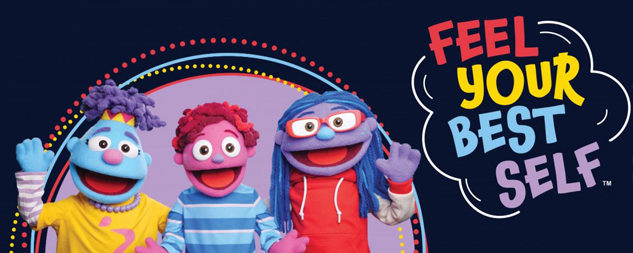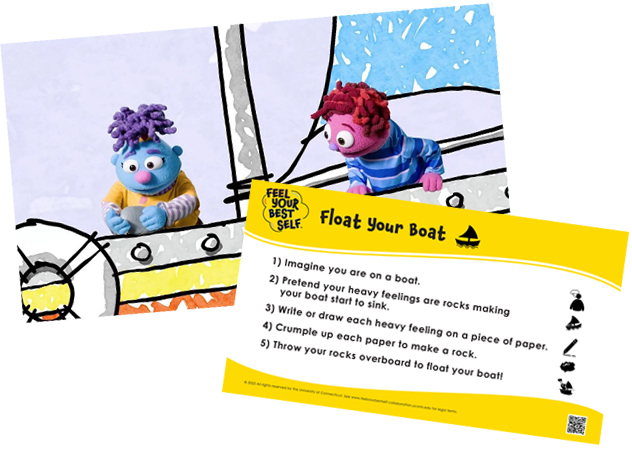
Bring Emotional Well-Being into a Kid's World with Feel Your Best Self
By Emily A. Iovino, Ph.D., Sandra M. Chafouleas, Ph.D., and Emily Wicks | September 2023

The current mental health crisis among children and teens continues to escalate; children, schools and families are struggling more than ever. Children and their caregivers need access to easy-to-use solutions that can promote emotional well-being, meaning how an individual feels in everyday moments and about life overall. One solution can be found in emotion-coping strategies, yet strategies must be easy to use by all and able to be quickly put in place within existing routines and structures. And learning strategies should be fun!
Our team at the University of Connecticut partnered to provide a unique solution through a collaboration between the Collaboratory on School and Child Health (CSCH) and the Ballard Institute and Museum of Puppetry. We created Feel Your Best Self (FYBS), a freely available toolkit that includes 12 simple and evidence-informed emotion-focused coping strategies. When used regularly, these sorts of coping skills can promote emotional well-being. FYBS strategies, although targeted toward a pre-K and elementary-aged audience, are important life skills for all ages that can be used to navigate different situations and, ultimately, help us feel our best.
To identify the strategies included in the toolkit, we first mapped existing evidence in emotion regulation, selecting emotion-coping strategies that could be easily taught. We then organized strategies into three catchy categories: Calm Yourself, Catch Your Feelings and Connect with Others. Calm Yourself strategies focus on self-soothing skills that can settle the body or refocus attention. Catch your Feelings strategies support self-awareness of one's emotional state, which can help re-focus attention or shift thoughts. Finally, Connecting with Others strategies are about social relationships, which could be choosing, offering or seeking connection.
FYBS offers flexibility for use across multitiered systems of support in schools. The primary use to date has been whole classroom, such as use during morning meetings or integration with existing social/emotional programs. Caregivers across settings, however, have used materials in lots of different ways – for example, in camp or afterschool programs or targeted use with students experiencing more intense needs and varied neurodiversities. The FYBS toolkit includes six primary components: introductory video and Feelings Forecast, strategy videos, strategy cards, reflection sheets, facilitator materials and options for incorporating puppet-making.

Introductory Video and Feelings Forecast
FYBS includes an introductory video that both introduces students to the three main puppet kids in the strategy videos and to the analogies used throughout to talk about and scale feelings. The Feelings Forecast is an accompanying tool that shows how feelings, with feeling words listed, can range from stormy to sunny.
Strategy Videos
Each of the 12 strategies includes a video that shows the puppet kids navigating big feelings in different situations by learning and practicing each strategy.
Strategy Cards
Each strategy also has a card that illustrates the three to five steps involved in using that strategy. Simple words and icons show what each step entails.
Reflection Sheets
Each strategy also has a reflection sheet that allows students to reflect on whether they liked a strategy, how using it made them feel, and when they could use the strategy again.
Facilitator Materials
Finally, each strategy and the introductory video has a facilitator lesson plan that can be used or adapted to teach the strategies. Each lesson is designed to take between 15-30 minutes depending on which components are included. There is also a facilitator introduction that outlines the evidence behind FYBS and important background to understand before getting started.
Puppet-Making
A unique FYBS element includes a puppet-making activity to extend learning and practice of the strategies. The use of puppets allows children to be met at their developmental level and helps to create a more relaxed learning environment. Particularly relevant to students with diverse needs, puppets offer opportunities to model social stories and coping strategies, engage students with communication differences (e.g., non-verbal), and connect with students who can be more difficult to reach.
How Can You Use FYBS?
FYBS is designed to be universally accessible with extension to address targeted and individualized goals. In our ongoing research on FYBS, including its usability and effectiveness, we have heard from school counselors who have used our facilitator lesson plans to teach strategies and have created their own materials that are specific to student goals.
School counselors have reported using FYBS to address goals related to emotion regulation with whole classes of students and in individual and small group counseling sessions. If, in your role, you push in or co-teach social/emotional learning lessons in classrooms, you might consider how you can integrate FYBS into what you are already doing. You can also explore how you might use FYBS in conjunction with your current repertoire of small-group and individual counseling interventions.
For more information and additional ideas for using FYBS, please visit our website www.feelyourbestself.org and follow us on all social media platforms @FeelURBestSelf.
Emily A. Iovino, Ph.D., is an assistant research professor in the Department of Educational Psychology at the University of Connecticut, and is implementation coordinator with Feel Your Best Self. Sandra M. Chafouleas, Ph.D., is Board of Trustees Distinguished Professor, Neag Endowed Professor of Educational Psychology and co-director of the Collaboratory on School and Child Health at the University of Connecticut. She is co-creator with Emily Wicks of Feel Your Best Self. Emily Wicks is also manager of operations and collections for the Ballard Institute and Museum of Puppetry at the University of Connecticut.
Our team at the University of Connecticut partnered to provide a unique solution through a collaboration between the Collaboratory on School and Child Health (CSCH) and the Ballard Institute and Museum of Puppetry. We created Feel Your Best Self (FYBS), a freely available toolkit that includes 12 simple and evidence-informed emotion-focused coping strategies. When used regularly, these sorts of coping skills can promote emotional well-being. FYBS strategies, although targeted toward a pre-K and elementary-aged audience, are important life skills for all ages that can be used to navigate different situations and, ultimately, help us feel our best.
To identify the strategies included in the toolkit, we first mapped existing evidence in emotion regulation, selecting emotion-coping strategies that could be easily taught. We then organized strategies into three catchy categories: Calm Yourself, Catch Your Feelings and Connect with Others. Calm Yourself strategies focus on self-soothing skills that can settle the body or refocus attention. Catch your Feelings strategies support self-awareness of one's emotional state, which can help re-focus attention or shift thoughts. Finally, Connecting with Others strategies are about social relationships, which could be choosing, offering or seeking connection.
FYBS offers flexibility for use across multitiered systems of support in schools. The primary use to date has been whole classroom, such as use during morning meetings or integration with existing social/emotional programs. Caregivers across settings, however, have used materials in lots of different ways – for example, in camp or afterschool programs or targeted use with students experiencing more intense needs and varied neurodiversities. The FYBS toolkit includes six primary components: introductory video and Feelings Forecast, strategy videos, strategy cards, reflection sheets, facilitator materials and options for incorporating puppet-making.

Introductory Video and Feelings Forecast
FYBS includes an introductory video that both introduces students to the three main puppet kids in the strategy videos and to the analogies used throughout to talk about and scale feelings. The Feelings Forecast is an accompanying tool that shows how feelings, with feeling words listed, can range from stormy to sunny.
Strategy Videos
Each of the 12 strategies includes a video that shows the puppet kids navigating big feelings in different situations by learning and practicing each strategy.
Strategy Cards
Each strategy also has a card that illustrates the three to five steps involved in using that strategy. Simple words and icons show what each step entails.
Reflection Sheets
Each strategy also has a reflection sheet that allows students to reflect on whether they liked a strategy, how using it made them feel, and when they could use the strategy again.
Facilitator Materials
Finally, each strategy and the introductory video has a facilitator lesson plan that can be used or adapted to teach the strategies. Each lesson is designed to take between 15-30 minutes depending on which components are included. There is also a facilitator introduction that outlines the evidence behind FYBS and important background to understand before getting started.
Puppet-Making
A unique FYBS element includes a puppet-making activity to extend learning and practice of the strategies. The use of puppets allows children to be met at their developmental level and helps to create a more relaxed learning environment. Particularly relevant to students with diverse needs, puppets offer opportunities to model social stories and coping strategies, engage students with communication differences (e.g., non-verbal), and connect with students who can be more difficult to reach.
How Can You Use FYBS?
FYBS is designed to be universally accessible with extension to address targeted and individualized goals. In our ongoing research on FYBS, including its usability and effectiveness, we have heard from school counselors who have used our facilitator lesson plans to teach strategies and have created their own materials that are specific to student goals.
School counselors have reported using FYBS to address goals related to emotion regulation with whole classes of students and in individual and small group counseling sessions. If, in your role, you push in or co-teach social/emotional learning lessons in classrooms, you might consider how you can integrate FYBS into what you are already doing. You can also explore how you might use FYBS in conjunction with your current repertoire of small-group and individual counseling interventions.
For more information and additional ideas for using FYBS, please visit our website www.feelyourbestself.org and follow us on all social media platforms @FeelURBestSelf.
Emily A. Iovino, Ph.D., is an assistant research professor in the Department of Educational Psychology at the University of Connecticut, and is implementation coordinator with Feel Your Best Self. Sandra M. Chafouleas, Ph.D., is Board of Trustees Distinguished Professor, Neag Endowed Professor of Educational Psychology and co-director of the Collaboratory on School and Child Health at the University of Connecticut. She is co-creator with Emily Wicks of Feel Your Best Self. Emily Wicks is also manager of operations and collections for the Ballard Institute and Museum of Puppetry at the University of Connecticut.